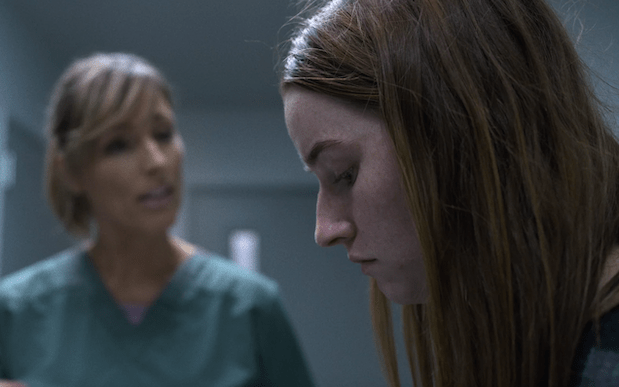
FYI – I’ve written this spoiler-free, aside from some of the initial episode information and other info that’s in the brief synopsis of the show.
Like a lot of you, I binged the hell out of Netflix’s new limited series, Unbelievable, over the weekend. From the first episode I was gripped – as a true crime obsessive, the promise of a murky criminal investigation was enough to hook me from the outset.
[jwplayer sZprJbcq]
Unbelievable is based on a true story, and absolutely floors you from the first scene, where we go back to 2008 to meet Marie Adler, a young woman who has just reported a break-and-enter rape. The entire first episode is dedicated to her report process – from multiple accounts of her horrific assault, to the lengthy and traumatic physical examination.
From there, the series introduces the first of two absolute boss bitches of detectives – Detective Karen Duvall, who is investigating a different sexual assault, this time taking place in 2011. As you can see, the series isn’t interested in throwing all its stellar cast at us at once. Toni Collette, who plays the other badass detective, Detective Grace Rasmussen, doesn’t enter the picture until the tail end of episode two.
I could go on and on about the expertly scripted unravelling investigation – which never feels too rushed or tediously slow. Or the phenomenal acting from pretty much the entire cast – Kaitlyn Dever, for example, deserves a mention – you might remember her from the also-brilliant Booksmart. She plays Marie, absolutely nailing what is a truly difficult role of a woman who has experienced trauma after trauma in her life but is also still quite young and naive about a lot of things.
But what’s really brilliant about Unbelievable is how it explores sexual assault.
The first episode is harrowing, obviously. There are multiple flashbacks to Marie’s rape, which are confronting – so much so that there’s a warning before the episode. But the deeper confrontation comes via the truly traumatic experience of assault survivors through the system. We see Marie repeat the story of her rape to the police, then the detectives, then the hospital as she moves through the processes of reporting the incident.
Then we follow Marie as she goes through the physical examination. It’s necessary – potentially getting DNA samples of the rapist is imperative for the investigation. But it’s also a truly invasive process someone who was just violated has to go through, pretty much immediately. There’s swabs, then more swabs, then a dye test to check for signs of trauma to the vaginal area, then a speculum is inserted to get internal swabs. I found this to be the most confronting scene of all – any woman knows the invasive experience a pap smear is, imagine having that times three immediately after being sexually assaulted?
Another thing Unbelievable does brilliantly is to show the dismissive attitudes toward violence towards women, both through the system and ingrained in social attitudes. Marie’s experience dealing with the police is horrendous. She has two male detectives who, while sympathetic to her experience, don’t approach it with even a quarter of the sensitivity in which Detective Karen Duvall does with Amber Stevenson, the 2o11 victim we meet in episode two. The juxtaposition of Marie’s experience vs. Amber’s makes a strong case for education around how to sensitively handle the initial stages of investigating a sexual assault.
But Marie’s experience obviously goes beyond that – it’s not a spoiler to tell you that not only is Marie’s case handled terribly from a sensitivity perspective, she is also then accused of lying about her experience. Instead of taking her confusion around the events that transpired as the natural response of someone who has experienced trauma, the detectives decide she’s lying about her experience. She’s pretty much bullied into writing a new report stating she initially lied about the rape, and is subsequently charged with filing a false report.
Also, without spoilers, we meet several male characters who exhibit disturbing yet extremely common attitudes towards violence against women, from domestic abusers who use the power of connection to avoid repercussions from their actions, to rapists who don’t consider their behaviour to be rape. Through the entire series, it’s drilled home – yet not in an overt fashion that makes it too heavy-handed – that the problem isn’t just the act of rape, it’s the wider attitude toward violence against women.
But the strongest statement the series makes about sexual assault, at least for me, is the different ways survivors respond. One of the most powerful moments for me in the series was in episode two, when we meet Amber. During her interview with Detective Duvall, Amber seems bright and “fine”, recalling an inordinate amount of detail about her attacker and his movements. Her demeanour is the complete opposite of Marie’s from episode one. But through the series we see that the trauma has absolutely affected her deeply. It’s an important message about understanding that the human response to trauma is not homogeneous – some people shut down, some seem “fine”, all emotional responses are valid.
If you haven’t started Unbelievable yet, I really encourage you to do so. It’s both a brilliantly scripted, tense crime series and an important look at how we socially respond to rape survivors.



